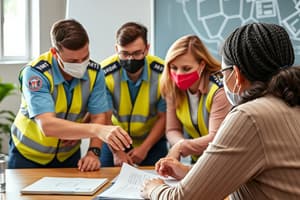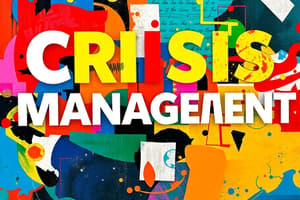Podcast
Questions and Answers
What is the primary focus of the 'Identification' phase in crisis management?
What is the primary focus of the 'Identification' phase in crisis management?
- Implementing immediate solutions to active crises.
- Developing communication strategies for stakeholders.
- Determining potential dangers and threats that could lead to a crisis. (correct)
- Restoring normal operations after a crisis event.
According to the presentation, the Chinese word for 'crisis' is composed of symbols representing what two concepts?
According to the presentation, the Chinese word for 'crisis' is composed of symbols representing what two concepts?
- Stability and instability.
- Danger and opportunity. (correct)
- Preparation and response.
- Strength and weakness.
Why is a prompt response considered essential during a crisis?
Why is a prompt response considered essential during a crisis?
- To start a new project.
- To mitigate damage, protect safety, and preserve stability. (correct)
- To ignore what happened.
- To blame someone.
What does the 'Preparation' stage of the crisis management cycle primarily involve?
What does the 'Preparation' stage of the crisis management cycle primarily involve?
What is the ultimate goal of the 'Recovery' phase in crisis management?
What is the ultimate goal of the 'Recovery' phase in crisis management?
What makes the Crisis Management Cycle an 'ongoing process'?
What makes the Crisis Management Cycle an 'ongoing process'?
Which of the following is the most accurate definition of a 'crisis' in the context of organizational management?
Which of the following is the most accurate definition of a 'crisis' in the context of organizational management?
What does effective crisis management primarily seek to protect?
What does effective crisis management primarily seek to protect?
Which of the following is the MOST important reason for a company to engage in the 'Prevention' stage of the crisis management cycle?
Which of the following is the MOST important reason for a company to engage in the 'Prevention' stage of the crisis management cycle?
According to the crisis management cycle, which phase directly follows 'Identification'?
According to the crisis management cycle, which phase directly follows 'Identification'?
Which activity is LEAST likely to be part of the 'Identification' phase of crisis management?
Which activity is LEAST likely to be part of the 'Identification' phase of crisis management?
In crisis management, what does 'mitigating long-term effects' primarily involve during the recovery process?
In crisis management, what does 'mitigating long-term effects' primarily involve during the recovery process?
How does crisis management differ from routine operational management?
How does crisis management differ from routine operational management?
If a company identifies a potential security breach during the Identification stage, what IMMEDIATE step should be taken in the subsequent Preparation phase?
If a company identifies a potential security breach during the Identification stage, what IMMEDIATE step should be taken in the subsequent Preparation phase?
Following a product recall due to safety concerns, which of the following actions BEST represents the 'recovery' phase?
Following a product recall due to safety concerns, which of the following actions BEST represents the 'recovery' phase?
Which of the following scenarios represents a failure in the 'preparation' phase of crisis management?
Which of the following scenarios represents a failure in the 'preparation' phase of crisis management?
During a social media crisis caused by negative customer reviews, how might a company demonstrate an effective 'response'?
During a social media crisis caused by negative customer reviews, how might a company demonstrate an effective 'response'?
How can an organization ensure the 'identification' phase is comprehensive and effective?
How can an organization ensure the 'identification' phase is comprehensive and effective?
What action during a crisis would be MOST beneficial in preserving the stability during turbulent periods?
What action during a crisis would be MOST beneficial in preserving the stability during turbulent periods?
Flashcards
What is a Crisis?
What is a Crisis?
Any event expected to lead to an unstable and dangerous situation affecting an individual, group, or whole organization.
What is Crisis Management?
What is Crisis Management?
The procedure a company uses to address a significant threat to its integrity, stakeholders, or the broader community.
Crisis Management Cycle
Crisis Management Cycle
A systematic method for addressing incidents that damage a company, guaranteeing readiness, efficient reaction, and recovery.
Identification in Crisis Management
Identification in Crisis Management
Signup and view all the flashcards
Preparation in Crisis Management
Preparation in Crisis Management
Signup and view all the flashcards
Response in Crisis Management
Response in Crisis Management
Signup and view all the flashcards
Recovery in Crisis Management
Recovery in Crisis Management
Signup and view all the flashcards
Study Notes
- Crisis management is an event expected to lead to, an unstable and dangerous situation affecting an individual, group, or whole organization. The Chinese words for crisis are “weixian” and “jihui”.
- "Weixian" means danger.
- "Jihui" means opportunity.
- Crisis management is the procedure to use when a company addresses a significant occurrence that poses a threat to its integrity, its stakeholders, or the broader community.
- Crisis management is a systematic method for addressing disruptive and unforeseen incidents that damage any company, society, or the structure.
- The crisis management cycle is an ongoing process that guarantees readiness, efficient reaction, and recovery from crises.
Crisis Management Cycle
- Identification: Determining potential dangers or threats that may precipitate a crisis. Involves risk evaluation, early warning mechanisms, and environmental analysis to identify vulnerabilities.
- Preparation: Formulating crisis management plans and the interaction approaches.
- Response: In the event of a crisis, prompt response is essential to mitigate damage, protect safety, and preserve stability.
- Recovery: After the management of the immediate crisis, organizations transition to reinstating normal operations and mitigating long-term effects.
- Prevention: preventing risks from happening.
Studying That Suits You
Use AI to generate personalized quizzes and flashcards to suit your learning preferences.




